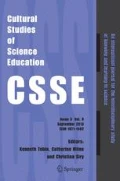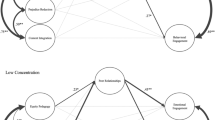Abstract
This paper describes the multiple school and school science experiences of eight Latina students of Central American descent in a tracked, urbanized, middle school setting. Framed by a sociocultural perspective, I describe how eight seventh and eighth grade Latino girls interacted with school science. Implications for the concept “science for all” are discussed.
Similar content being viewed by others
References
American Association for the Advancement of Science. (1989). Science for all Americans. Washington, DC: American Association for the Advancement of Science Press.
Anzaldúa, G. (2007). La conciencia de la mestiza. In A. Bailey & C. Cuomo (Eds.), The feminist philosophy reader (pp. 870–878). New York: McGraw-Hill. (Originally published in 1987).
Banquet, N. (1994). Making science meaningful for language minority students. Equity Coalition, 3(2), 13–16.
Barry, T. (1991). Central America inside out: The essential guide to its societies, politics, and economies. New York: Grove Weidenfeld.
Booth, J., & Walker, T. (1999). Understanding Central America. Boulder, CO: Westview Press.
Brick, K., Challinor, A. E. & Rosenblum, M. R. (2011). Mexican and Central American immigrants in the United States. Washington, DC: Migration Policy Institute. Retrieved February 6, 2012, from www.migrationpolicy.org/pubs/mexcentamimmigrants.pdf.
Bruna, K. (2010). Transnational social capital and the work of peer mediation in an English learner science classroom. Cultural Studies of Science Education, 5, 383–422.
Calabrese Barton, A., Drake, C., & Gustavo, J. (2004). Ecologies of parental engagement in urban education. Educational Researcher, 33(4), 3–12. doi:10.3102/0013189X033004003.
Calabrese Barton, A., & Osborne, M. D. (1995). Science for all Americans? Science education reform and Mexican-Americans. The High School Journal, 78, 244–252.
Catsambis, S. (1994). The path to math: Gender and racial-ethnic differences in mathematics participation from middle school to high school. Sociology of Education, 67, 199–215. doi:10.2307/2112791.
Chapa, J., & De La Rosa, B. (2006). The problematic pipeline: Demographic trends and Latino participation in graduate science, technology, engineering, and mathematic programs. Journal of Hispanic Higher Education, 5, 203–221. doi:10.1177/1538192706288808.
Cole, D., & Espinoza, A. (2008). Examining the academic success of Latino students in science, technology, engineering and mathematics (STEM) majors. Journal of College Student Development, 49, 285–300. doi:10.1353/csd.0.0018.
Costa, V. B. (1995). When science is “another world”: Relationships between worlds of family, friends, school, and science. Science Education, 79, 313–333. doi:10.1002/sce.3730790306.
Delpit, L. (1995). Other people’s children: Cultural conflict in the classroom. New York, NY: New Press.
Flores, G. (2011). Latinos/Latinas in the hard sciences: Increasing Latina/o participation in the science, technology, engineering and math (STEM) related fields. Latino Studies, 9, 327–335. doi:10.1057/lst.2011.36.
Gallard, A. (2008a). Complexity and the universe of education. Forum on Public Policy. Retrieved February 11, 2013 from http://forumonpublicpolicy.com/summer08papers/archivesummer08/gallard.pdf.
Gallard, A. (2008b). We are more different than alike: Latinos/Latinas-Hispanics. In W. M. Roth & K. Tobin (Eds.), World of science education: Handbook of research in North America (Vol. 1, pp. 353–368). North America: Sense.
Gallard, A. (2009). Dignifying the educational process through conscientização. Cultural Studies of Science Education, 4, 733–738. doi:10.1007/s11422-009-9191-8.
Gándara, P. (2006). Strengthening the academic pipeline leading to careers in math, science, and technology for Latino students. Journal of Hispanic Higher Education, 5, 222–237. doi:10.1177/1538192706288820.
Gilbert, A., & Yerrick, R. (2001). Same school, separate worlds: A sociocultural study of identity, resistance, and negotiation in a rural, lower track science classroom. Journal of Research in Science Teaching, 38, 574–598. doi:10.1002/tea.1019.
Hazelwood, C. (1996). Shaping identities in school science: A narrative study of girls of Mexican American origin. Unpublished doctoral dissertation. Michigan State University.
H.R. 1804–103rd Congress: Goals 2000: Educate America Act. (1993). In www.GovTrack.us. Retrieved January 16, 2014, from http://www.govtrack.us/congress/bills/103/hr1804.
Humes K. R., Jones N. A., & Ramirez R. R. (2011). Overview of race and Hispanic origin: 2010. U.S. Census Bureau. http://www.census.gov/prod/cen2010/briefs/c2010br-02.pdf. Accessed on September 12, 2012.
Lee, O. (2003). Equity for culturally and linguistically diverse students in science education: A research agenda. Teachers College Record, 105, 465–489. doi:10.1111/1467-9620.00247.
Lemke, J. (1990). Talking science: Language, learning and values. Norwood, NJ: Ablex Press.
Lemke, J. (2001). Articulating communities: Sociocultural perspectives on science education. Journal of Research in Science Teaching, 38, 296–316. doi:10.1002/1098-2736(200103)38:3<296:AID-TEA1007>3.0.CO;2-R.
Lynch, S. J. (2000). Equity and science education reform. Mahwah, NJ: Lawrence Erlbaum Associates.
Meyer, X. S., Capps, D. K., Crawford, B. A., & Ross, R. (2012). Using inquiry and tenets of multicultural education to engage Latino English-language students in learning about geology and the nature of science. Journal of Geoscience, 60, 212–219.
National Academy of Sciences. (2011). Framework for K-12 science education: Practices, crosscutting concepts, and core ideas. Washington, DC: National Academies Press.
National Assessment of Educational Progress (NAEP). (2011). The nations’ report card, 2011. Retrieved February 1, 2013 from http://nationsreportcard.gov/science_2011/science_2011_report/.
National Research Council. (1996). National science education standards. Washington, DC: National Academies Press.
National Research Council. (2012). A framework for K-12 Science education: Practices, crosscutting concepts, and core ideas. Washington, DC: The National Academies Press.
Oakes, J. (1990). Multiplying inequalities: The effects of race, social class, and tracking on opportunities to learn mathematics and science. Santa Monica, CA: Rand Corporation.
Page, R. (1999). The uncertain value of school knowledge: Biology at Westridge High. Teachers College Record, 100, 554–601. doi:10.1111/0161-4681.00004.
Roseberry, A. S., Warren, B., & Conant, F. R. (1992). Appropriating scientific discourse: Findings from language minority classrooms. The Journal of the Learning Sciences, 2, 61–94. doi:10.1207/s15327809jls0201_2.
Tan, E., & Calabrese Barton, A. (2008). Unpacking science for all through the lens of identities-in-practice: The stories of Amelia & Ginny. Cultural Studies in Science Education, 3, 43–71. doi:10.1007/s11422-007-9076-7.
Zuniga, K., Olson, J. K., & Winter, M. (2005). Science education for rural Latino/a students: Course placement and success in science. Journal of Research in Science Teaching, 42, 376–402. doi:10.1002/tea.20064.
Author information
Authors and Affiliations
Corresponding author
Additional information
Lead Editors: K. Scantlebury and A. Hussénius.
Rights and permissions
About this article
Cite this article
Parker, C. Multiple influences: Latinas, middle school science, and school. Cult Stud of Sci Educ 9, 317–334 (2014). https://doi.org/10.1007/s11422-014-9573-4
Received:
Accepted:
Published:
Issue Date:
DOI: https://doi.org/10.1007/s11422-014-9573-4




